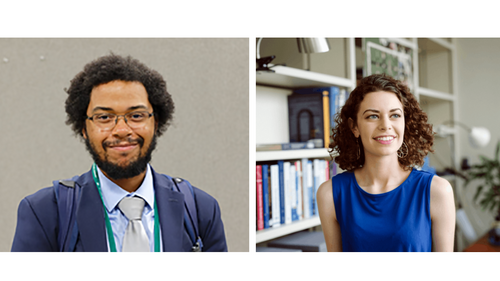
Talia Weiss, physics graduate student and a member of Yale’s Wright Lab, and Yale physics and Wright Lab alum Nathaniel Barbour, YC‘18 Physics (Intensive) major, now a physics Ph.D, candidate at the University of Maryland have been chosen as 2023 Next-Generation Fellows of the Physicists Coalition for Nuclear Threat Reduction.
Throughout the next year, the fellows will work together with Coalition experts to grow their science advocacy skills and build their knowledge of nuclear weapons policy.
 Barbour commented, “As physicists in the twenty-first century, we share a collective responsibility to bear the memory of the Manhattan Project and the Cold War that followed. With rising tensions between nuclear-armed states, we must apply scientific inquiry to identify and advocate for policies that minimize threats from nuclear weapons.
Barbour commented, “As physicists in the twenty-first century, we share a collective responsibility to bear the memory of the Manhattan Project and the Cold War that followed. With rising tensions between nuclear-armed states, we must apply scientific inquiry to identify and advocate for policies that minimize threats from nuclear weapons.
I attended Yale to study physics to learn means of building a safer, more equitable society. As a 2023 Next-Generation Fellow, I am honored and excited for the opportunity to assist the Physicists Coalition for Nuclear Threat Reduction in their ongoing global security mission”
Barbour is a Physics Ph.D. candidate at the University of Maryland, studying plasma physics for nuclear fusion energy. His research explores the potential for machine learning algorithms to accelerate gyrokinetic turbulence simulations. As an undergraduate at Yale University, he studied cosmology and began his path into fusion energy with two internships at the Princeton Plasma Physics Laboratory. His experiences at the national laboratory and in science and environmental policy courses have inspired him to seek solutions to critical global challenges at the intersection of science and policy.
 Weiss said, “I am excited for this opportunity to connect physics knowledge with policy research and advocacy in an effort to reduce dangers posed by nuclear weapons. Physicists have a rich legacy of promoting arms control and conducting key technical analyses, given our field’s central role in creating nuclear weapons. The Physicists Coalition Fellowship program is helping my generation to continue this legacy, and I’m so grateful for that.”
Weiss said, “I am excited for this opportunity to connect physics knowledge with policy research and advocacy in an effort to reduce dangers posed by nuclear weapons. Physicists have a rich legacy of promoting arms control and conducting key technical analyses, given our field’s central role in creating nuclear weapons. The Physicists Coalition Fellowship program is helping my generation to continue this legacy, and I’m so grateful for that.”
Weiss’ research in the Heeger group centers on measuring the neutrino mass using tritium beta decay with the Project 8 experiment. She holds an M.A. in Political Science from the University of Chicago and a B.S. in Physics from MIT.
Weiss said, “I look forward to applying the physics that I’ve learned at Yale to my work for the Fellowship, and to bringing the Fellowship’s issues and approaches to the Yale Physics community.”
At Yale, Weiss created and leads the Kimball Smith Series, a program that tackles issues at the intersection of science and global affairs—ranging from nuclear weapons risks to artificial intelligence policy. Previously, she developed a similar event series for the Bulletin of the Atomic Scientists.
Weiss serves as Deputy Director of International Student/Young Pugwash (ISYP), a global network of young professionals who engage in cross-national dialogue on topics in science and security. She has written and spoken on the history of scientific self-regulation, lessons learned from the case of Nazi nuclear physicists, and how the inventors of CRISPR gene editing viewed the ethics of their research.